Baccalaureate Ceremony Marks End of the Academic Year
By Rebecca GoldfineBowdoin's Baccalaureate, on Friday, May 23, 2025, in Sidney J. Watson Arena, celebrated the completion of the academic year. The College’s 220th Commencement follows on Saturday, May 24.
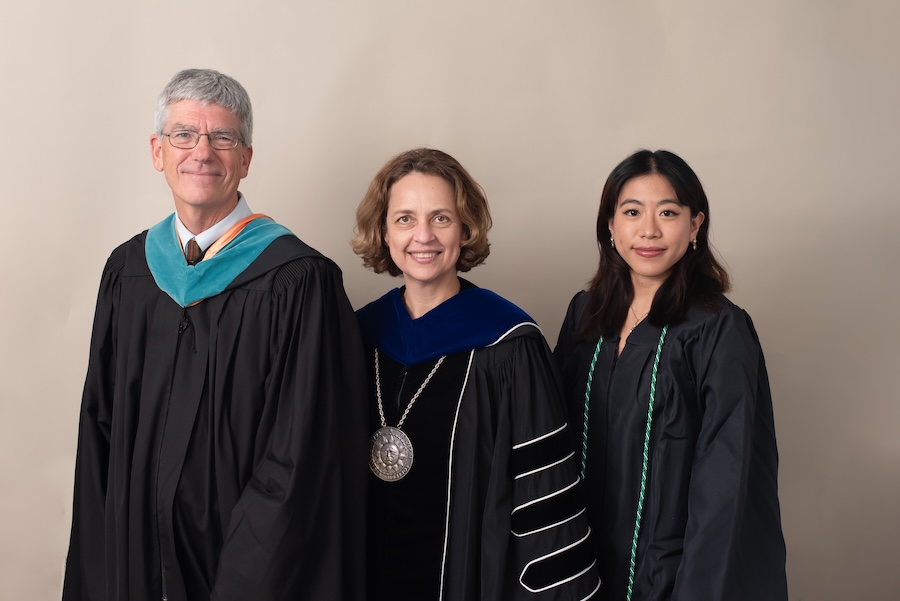
The special event is a chance for graduates and their families to come together to reflect on their academic journey at Bowdoin. The ceremony typically features three speakers: the president of the college, a graduating senior, and a scholarly guest.
This year, Isabella Jingyuan Huang ’25 won the privilege to give remarks at Baccalaureate with her address, “The Wisdom of an Egg,” about her evolving relationship with food and language during her time at Bowdoin.
Thomas Putnam ’84, former director of the John F. Kennedy Presidential Library and Museum, spoke about two famous students in Bowdoin’s famous Class of 1825—Nathanial Hawthorne and Henry Wadsworth Longfellow.
President Safa Zaki spoke about what the AI revolution might teach us about our humanity.
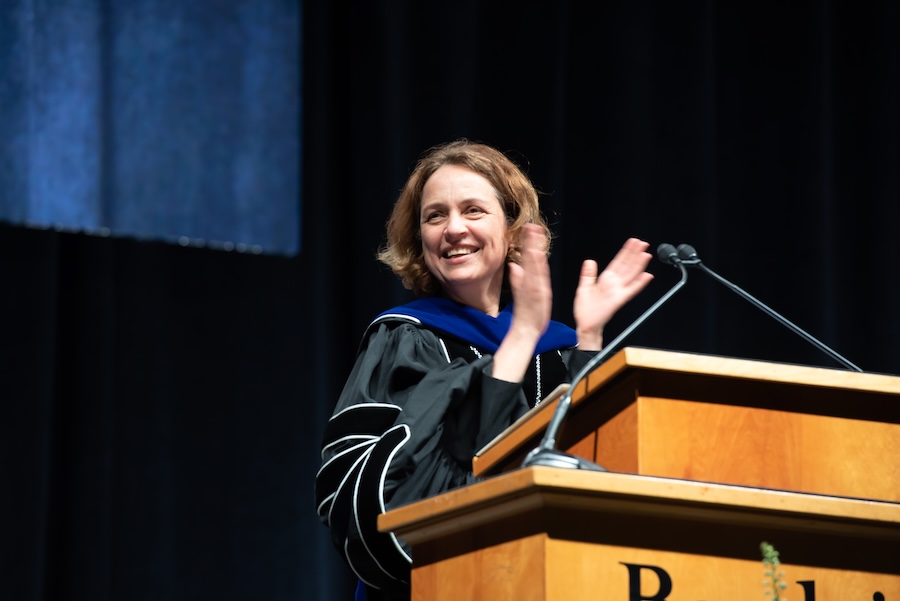
President Safa Zaki's Welcome
Zaki, who presided over the event, shared her hopes for the soon-to-be graduates, focusing much of her attention on a world soon to be reshaped by artificial intelligence.
Zaki asked the audience to consider a central question of this moment—how do we know what it is to be human? She said the AI revolution is a chance for us “to reconsider and not take for granted the meaning of being human, the value of human relationships, and the good that comes from living, working, and learning in community with others.”
One way to think about our humanness, she posited, is our simple yet profound ability to pay attention to one another. She quoted British novelist and philosopher Iris Murdoch, who wrote an essay inspired by her visit to Bowdoin in 1966, when she attended a conference for the Study Group on Foundations of Cultural Unity.
Murdoch suggests in her essay that the “capacity to give true attention to another being lies at the absolute center of ethical life,” Zaki quoted. “Love,” Murdoch writes, “is the extremely difficult realization that something other than oneself is real.”
The practice of paying attention to others is “messy, dynamic, unstable, and non-neutral,” but it is a way of caring—and is one of our most important projects as humans, Zaki said.
AI could be the prompt for us to turn toward one another even more. “What will we find when we return to ourselves?,” she asked. “In fact, this current AI revolution might even be taken as an invitation to develop a new understanding of human consciousness.”
“The project of knowing what is to be human, knowing what it is to be oneself, and knowing that something other than oneself is real, is not the project of AI. It is, though, the most important project we have.”
—President Safa Zaki
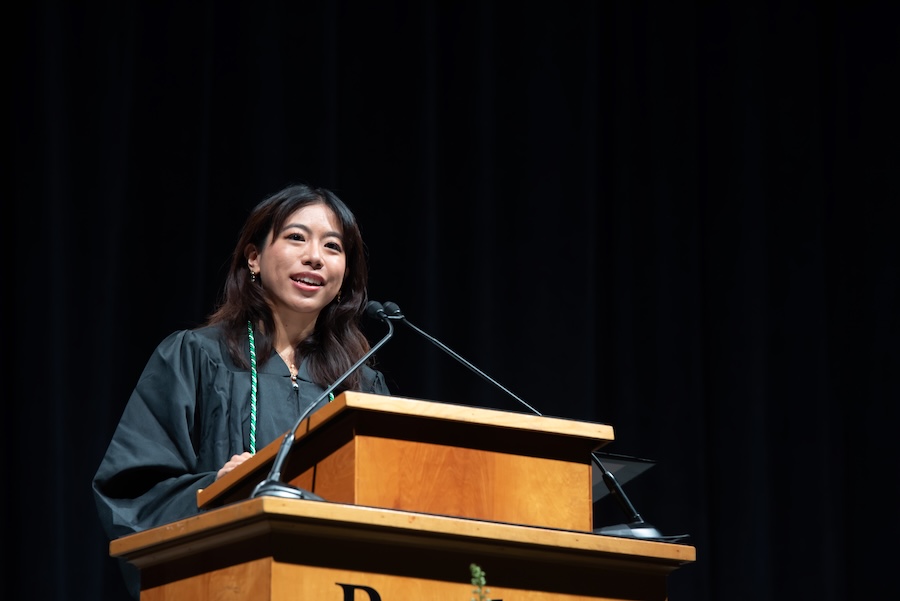
Isabella Jingyuan Huang ’25, “The Wisdom of Eggs”
Huang, an English and government major, dedicated a year at Bowdoin to studying how “modern women writers repurpose disgust, vegetarianism, and fasting as bodily resistance.”
As she immersed herself in texts, she decided that eggs are akin to language in that they are “endlessly adaptable” and “absorb new meanings and shift to fit new contexts.”
Following this tradition, she adapted the egg for her own purpose, to reflect on her experience at Bowdoin in her Baccalaureate address. “If I had to distill my Bowdoin experience into one image, I wouldn’t choose the lobster bake or the delicious double chocolate chip cookies. No, I would choose the humble egg,” she said.
“My journey as a first-gen immigrant has mirrored the fate of an egg—fragile, often invisible as an ingredient, constantly adapting to hold its shape in unfamiliar surroundings. But Bowdoin has taught me how to extend that metaphor: only through the breakage of an egg, could something nourishing emerge. My displacement is not just loss; it is also transformation.”
As she wrapped up her engaging talk, she urged her peers to “be good eggs” as they step into a world of “broken systems—ones that ration opportunity, compassion, and even the rights to speak our truth.”
“But if Bowdoin has taught us anything at all, it’s how to be a good egg—how to be versatile, resilient, and unafraid of breaking sometimes,” she continued. “We have learned how to make meanings out of the ordinary, how to nourish not just ourselves but each other. So let’s take that with us. Let’s question the structures that leave people hungry—not just for food, but for justice, for dignity, for safety, for belonging. Let’s not just be good eggs; let’s go crack open some new ones.”
“Bowdoin gathers people from all around the world, each of our stomachs carrying a different memory of what raised us. And yet, in the dining halls, we set aside our dietary differences and many other differences. Over the past four years, we sat together, ate together. Chatted and laughed together. It was at these tables, over eggs Benedict or those divine mozz sticks at Supers, that I learned what it means to truly belong.”
— Isabelle Jingyuan Huang ’25
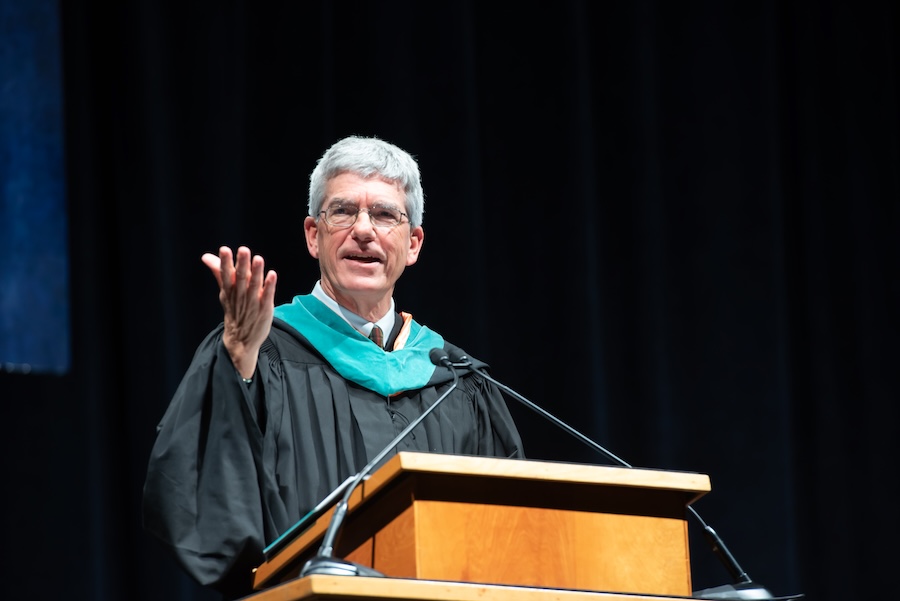
Tom Putnam ’84: “Literary Pioneers—A Bowdoin Bicentennial”
In his remarks, Putnam examined the lingering legacy of Hawthorne and Longfellow, who both graduated from Bowdoin in 1825.
Putnam first turned his attention to Hawthorne. “A lesson we might take from Hawthorne’s writings is the importance, when examining history, of not ignoring moments of tribulation and misjudgment,” he said. He singled out Hawthorne's novel The Scarlet Letter and its examination of the merciless Salem witchcraft trials.
Hawthorne's words “have become an integral part of our literary canon addressing timeless questions concerning how individuals of conscience confront moral dilemmas within the reigning orthodoxies of their time,” Putnam said.
Different lessons are gleaned from reading Longfellow, who tended to “temper his poetry with an optimism befitting a new nation,” Putnam said.
Longfellow's writing, especially his abolitionist poem Paul Revere’s Ride, spurred people “to use heroic moments from the past to inspire civic action in the present,” Putnam said. In this poem, Longfellow urged Northerners to fight for the preservation of the Union and the end of slavery.
Putnam then recalled a 1963 speech by President John F. Kennedy about the role of writers and artists in a democracy. .“...Artists,” he quoted the president, “when faithful to their personal visions of reality, become the last champions of the individual mind against an intrusive society and an officious state.”
Putnam concluded his story about Kennedy with a wish: “As you listen to his words celebrating artists like Hawthorne, Longfellow, Stowe, and Frost, I hope you will see the contrast JFK makes between democratic and authoritarian rule.”
He continued: “Nathaniel Hawthorne and Henry Wadsworth Longfellow served our nation admirably by being faithful to the truth as they perceived it. And through their pioneering literary efforts, they gave their age strength to confront the challenges of their times.”
“To the graduates of the Class of 2025, our hopes for you are manifold, including that the lessons you have learned here will empower you as individuals of conscience to remain true to yourselves—no matter the prevailing winds. ”
—Tom Putnam ’84
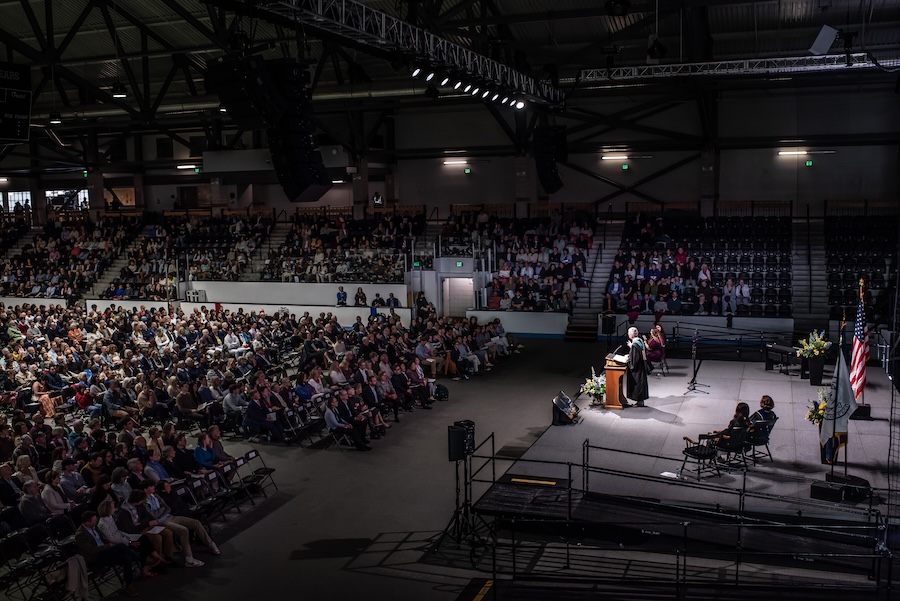
Baccalaureate Music
The audience was led through renditions of “America the Beautiful” and “Raise Songs to Bowdoin” by vocalists from the Class of 2025 and pianist George Lopez, Robert Beckwith Artist-in-Residence.
In addition, senior a cappella members sang the John Lennon and Paul McCartney song, “In My Life,” arranged by Brendan Hill ’25.


